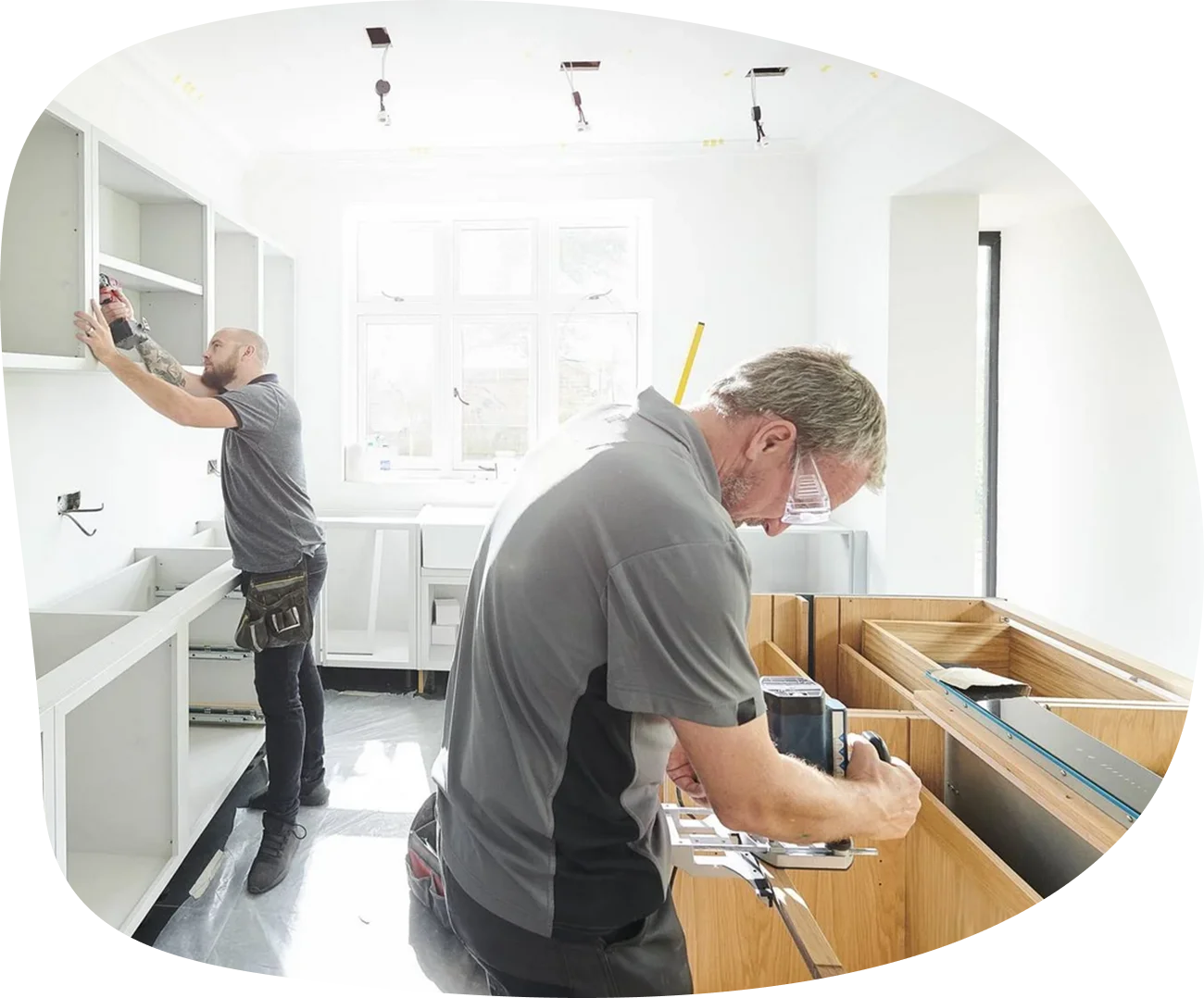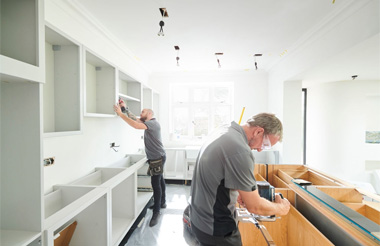Property Refurbishment Finance
Refurbishing an old or neglected flat or house is an excellent way to quickly and efficiently inflate its value, but generally requires a significant amount of investment capital.


Property Refurbishment Finance
In the wake of recent restrictions on residential property tax relief, landlords are increasingly searching for ways to add value to their properties. With that in mind, this handy guide explains what refurbishment involves and how it can be financed if you don’t have the upfront cash to fund it.
What does refurbishment finance mean?
The term refurbishment covers any works that are required to update a property and add value to it. These can include all kinds of things, such as painting and decorating, installing a new kitchen, adding an extension or conducting minor structural adjustments. In general, refurbishment entails far less investment and labour than property development projects.
Property or loan details
Based on your details, you can borrow up to:
£0This calculator is an estimation of how much you could borrow. If you’re ready to take out a mortgage, speak to a Revolution brokers to see what options are available.
Why should I refurbish my property?
Refurbishment is most commonly used to add value to a property, either in terms of a higher monthly rental income or a greater resale price. Some mortgage providers will also stipulate that refurbishment works must be carried out in order for the property to attain a rentable standard (most commonly in order to raise its Energy Performance Certificate (EPC) rating) before approving an application. Ideally, the projected returns of conducting the refurbishment (in terms of rental increases or sale profit) will more than cover the expected outlay of the works themselves.
What’s the difference between light refurbishment and heavy refurbishment?
Depending on the intensity of the works required and the length of time estimated that it will take to complete them, a refurbishment will be defined as either light or heavy. This will also influence the kind of loan your mortgage broker will seek on your behalf (a theme to which we’ll return later).
Light refurbishment projects are generally ones which involve decorating the property in some way, either by painting it or installing a new kitchen or bathroom, for example. Any changes that are made to the premises are aesthetic, not structural, and the works should normally be completed in less than half a year.
Heavy refurbishment projects, on the other hand, involve structural changes to the property itself. These often require the application and approval of planning permission or other building regulations and, as a result, normally take longer six months to reach completion.
How does property refurbishment finance work?
Refurbishment finance most commonly takes the form of a bridging loan. A lender will loan you the capital required to carry out the refurbishment project, with the total sum available based on the initial purchase price of the property and the expected valuation increase that the works will bring about. Once the refurbishment is completed, the loan is repaid over a short period of time that is agreed before the loan is taken out. The property can then either be sold on or transferred onto a traditional buy-to-let mortgage.
Since residential buy-to-let property has become increasingly popular in recent years, some providers now offer a refurbishment loan and a standard buy-to-let mortgage as a single, packaged deal. The terms of both the initial loan and the subsequent mortgage are agreed prior to any work beginning, and once it is completed and a second valuation is conducted, the borrower can switch straight onto the pre-agreed mortgage plan. One of the main attractions of packaging the products together like this is that they only require a single application and conveyance, meaning you can make great savings when it comes to paying for separate fees. To learn more about these types of deals, get in touch with us at 0330 304 3040.
What is required to apply for property refurbishment finance?
Firstly, it’s vital that you have a long-term plan for the property after the refurbishment works are completed. This normally takes the shape of either selling the property on or renting it out to tenants. Whichever path you decide to take, you must inform your broker of your plans so that they can search for the lender that’s most appropriate for your unique circumstances.
Secondly, lenders will also often stipulate that you must have some experience in the property refurbishment sector. If you have not refurbished a property before (with the explicit intention of selling it on or renting it out after the fact), they will examine your experience in the trades of construction and decoration. This is vital information for them to be able to determine whether you’re fully aware of the costs and times involved in undertaking a project of this kind. Unlike most standard mortgages, which are almost exclusively focused on your financial capacity to meet the mortgage repayments, your experience in refurbishment is just as important to a successful application as a robust financial history.
What’s involved in obtaining refurbishment finance for a residential buy-to-let property?
Of course, your financial credentials are still going to be of utmost importance to any potential lender when it comes to applying for a refurbishment loan for a buy-to-let property. As such, the loan provider will likely assess the projected rental income of the property after the refurbishment to ensure that it will be sufficient to meet your repayments. All due diligence, risk assessments and credit history checks will focus on you, not your proposed tenants.
The amount of money available for you to borrow for refurbishment of a residential buy-to-let property will vary depending on the exact circumstances of your situation and the property in question. However, as a general rule of thumb, those looking to carry out light refurbishment works can expect to access interest rates of 0.49% for the initial, bridging part of the financial arrangement, followed by rates beginning at 2.99% for the buy-to-let mortgage phase which follows.
What’s involved in obtaining refurbishment finance for a commercial buy-to-let property?
As with all commercial loans, it’s likely that the financial provider will undertake more comprehensive due diligence than a standard buy-to-let property application will entail. As well as your own credit history and spending habits, the provider will also wish to examine the records of the proposed tenant who is planning to set up their business in the property. In general, they prefer established, reliable companies on long leases, as these factors reduced the perceived risk associated with the tenant.
It should be remembered that commercial interest rates are normally higher than residential buy-to-let ones, and the exact amount of money available to you and the interest rates you will be charged will depend upon your own particular circumstances and credit history. As a general rule, you can expect to access rates beginning at 0.83% per month for a light refurbishment financing loan, while the subsequent mortgage phase is likely to be negotiated on a case-by-case basis. At present, no lenders offer a package deal for commercial refurbishment properties, so a standard commercial mortgage will need to be found once the works have been completed. Your broker can help you with this endeavour.
What fees are involved in refurbishment finance loans?
There are a number of different fees associated with applying for and securing a refurbishment loan, which can include (but are not limited to):
Further Reading
-
Financing a Buy-to-Let HMO and UK Licensing Rules
-
LTD Company Property Finance
-
Property Refurbishment Finance
-
Buy To Let Mortgages for Expats
-
Buy To Let Refurbishment Mortgages
-
Portfolio Landlord Mortgages
-
Buy to Let Interest-Only Mortgages
-
Changing Your Mortgage to Buy to Let
-
Mortgages for Buy to Sell Investments
-
Company Mortgages for SPVs
-
Stamp Duty for Buy to Let
-
Repayment Mortgage for Buy to Let
-
Buy To Let Mortgages For New Builds
-
Buy To Let Mortgages For Retiree Landlords
-
Buy To Let Mortgage With Poor Credit
-
Securing BTL Mortgage Quotes & BTL Agreement
-
BTL UK Portfolio Mortgages
-
Best Buy to Let Mortgages: 75% LTV
-
Buy to let 80% LTV Mortgages
-
Holiday Let Mortgages
-
Buy to Let Remortgage
-
Buy to Let Mortgages Guide for Investors
-
Let to Buy
-
Applying for a Buy-to-Let Mortgage Without a Minimum Income
Explore Our Presence
Securing an excellent mortgage offer with Revolution Finance
Brokers couldn't be easier:
Revolution Mortgage Brokers:
100% Independent & Whole-of-Market
As specialist mortgage brokers for a huge variety of applicants, the whole-of-market consultants at Revolution provide access to an exceptional range of lenders, products and mortgage deals. That means you get the advantage of professional negotiation and broker-exclusives through an established lending network to ensure we always find you the most competitive mortgage available.
Ask the Expert
Mortgage Brokers


























